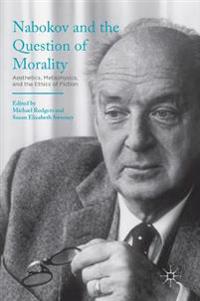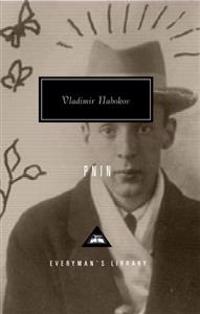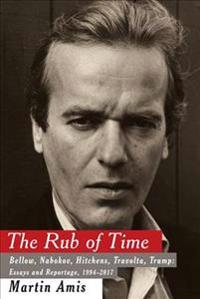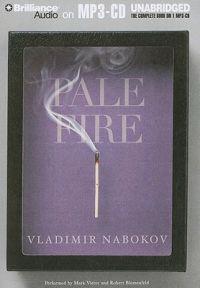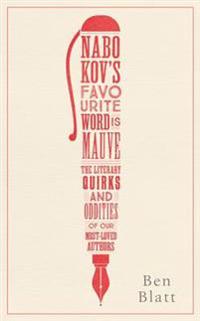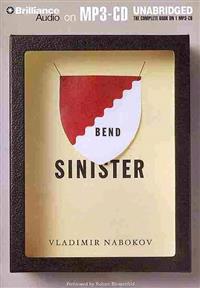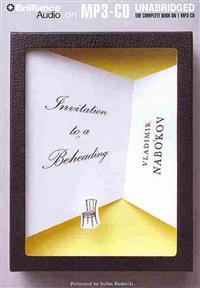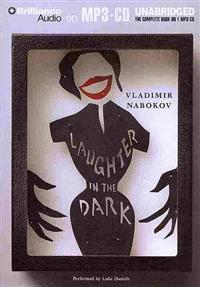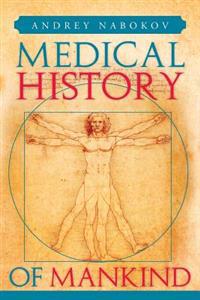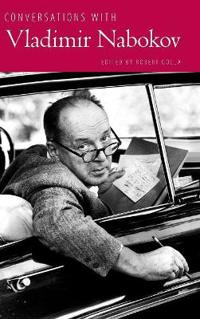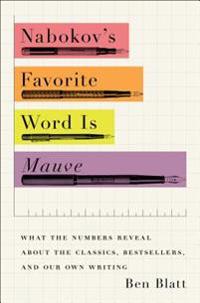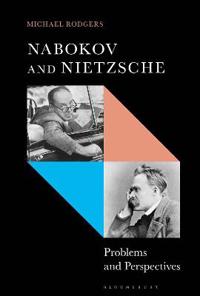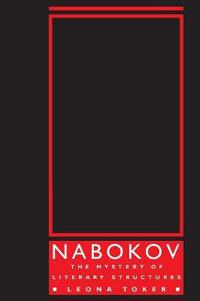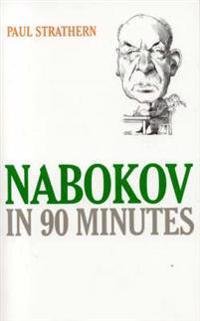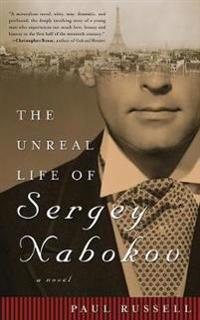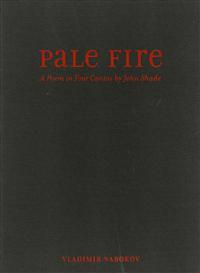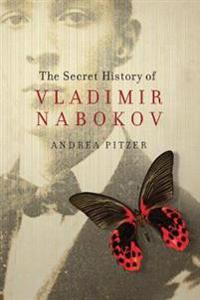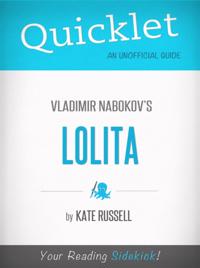Nabokov, Rushdie, And The Transnational Imagination (Pocket)
avRachel Trousdale
ISBN: 9781137346742 - UTGIVEN: 2013-08-01Using Vladimir Nabokov and Salman Rushdie's work, this study argues that transnational fiction refuses the simple oppositions of postcolonial theory and suggests the possibility of an inclusive global literature.[...]
Nabokov and the Question of Morality
ISBN: 9781137596666 - UTGIVEN: 2016-09The first collection to address the vexing issue of Nabokov's moral stances, this book argues that he designed his novels and stories as open-ended ethical problems for readers to confront. In a dozen new essays, international Nabokov scholars tackle those problems directly while addressing such que[...]
Pnin (Inbunden)
avVladimir Nabokov, David Lodge
ISBN: 9781400041985 - UTGIVEN: 200404The National Book Award-nominated classic finds hapless Russian migr Timofey Pnin precariously employed on an American college campus in the 1950s, where he falls victim to subtle academic conspiracies and the manipulations of the narrator. 10,000 first printing.[...]
The Rub of Time: Bellow, Nabokov, Hitchens, Travolta, Trump: Essays and Reportage, 1994-2017
ISBN: 9781400044535 - UTGIVEN: 2018-02The definitive collection of essays and reportage written during the past thirty years from one of most provocative and widely read writers--with new commentary by the author. For more than thirty years, Martin Amis has turned his keen intellect and unrivaled prose loose on an astonishing range of t[...]
Pale Fire (Övrigt)
avVladimir Nabokov, Mark Victor, Robert Blumenfeld
ISBN: 9781441872784 - UTGIVEN: 2010-11In Pale Fire, Nabokov offers a cornucopia of deceptive pleasures: a 999-line poem by the reclusive genius John Shade; an adoring foreword and commentary by Shade's self-styled Boswell, Dr. Charles Kinbote; a darkly comic novel of suspense, literary idolatry, one-upmanship, and political intrigue. Th[...]
Look at the Harlequins! (Övrigt)
avVladimir Nabokov, Stefan Rudnicki
ISBN: 9781441873545 - UTGIVEN: 2011-10As intricate as a house of mirrors, Nabokov's last novel is an ironic play on the Janus-like relationship between fiction and reality. It is the autobiography of the eminent Russian-American author Vadim Vadimovich N. (b. 1899), whose life bears an uncanny resemblance to that of Vladimir Vladimirovi[...]
Nabokov's Favourite Word is Mauve
ISBN: 9781471152825 - UTGIVEN: 2017-03What is your favourite author's favourite metaphor? This book will offer you the answers. Nabokov's Favourite Word is Mauve explores what the numbers can reveal about literature's classics, number one bestsellers and our own writing.[...]
Nabokov's Favourite Word is Mauve (häftad)
ISBN: 9781471159497 - UTGIVEN: 2017-03What is your favourite author's favourite metaphor? This book will offer you the answers. Nabokov's Favourite Word is Mauve explores what the numbers can reveal about literature's classics, number one bestsellers and our own writing.[...]
Bend Sinister (Övrigt)
avVladimir Nabokov, Robert Blumenfeld
ISBN: 9781480541672 - UTGIVEN: 2013-12The first novel Nabokov wrote while living in America and the most overtly political novel he ever wrote, Bend Sinister is a modern classic. While it is filled with veiled puns and characteristically delightful wordplay, it is, first and foremost, a haunting and com- pelling narrative about a civili[...]
Invitation to a Beheading (Övrigt)
avVladimir Nabokov, Stefan Rudnicki
ISBN: 9781480543027 - UTGIVEN: 2013-12Like Kafka's The Castle, Invitation to a Beheading embodies a vision of a bizarre and irrational world. In an unnamed dream country, the young man Cincinnatus C. is condemned to death by beheading for ?gnostical turpitude, ? an imaginary crime that defies definition. Cincinnatus spends his last days[...]
Laughter in the Dark (Övrigt)
avVladimir Nabokov, Luke Daniels
ISBN: 9781480543065 - UTGIVEN: 2013-12Albinus, a respectable, middle-aged man and aspiring filmmaker, abandons his wife for a lover half his age: Margot, who wants to become a movie star herself. When Albinus introduces her to Rex, an American movie producer, disaster ensues. What emerges is an elegantly sardonic and irresistibly ironic[...]
Conversations With Vladimir Nabokov
ISBN: 9781496810953 - UTGIVEN: 2017-04This volume brings together candid, revealing interviews with one of the twentieth century's master prose writers. Vladimir Nabokov (1899-1977) was a Russian American scientist, poet, translator, and professor of literature. Critics throughout the world celebrated him for developing the luminous and[...]
Conversations with Vladimir Nabokov (häftad)
ISBN: 9781496820242 - UTGIVEN: 2018-06Conversations with Vladimir Nabokov brings together candid, revealing interviews with one of the twentieth century's master prose writers. Vladimir Nabokov (1899-1977) was a Russian American scientist, poet, translator, and professor of literature. Critics throughout the world celebrated him for dev[...]
Nabokov's Women
ISBN: 9781498503303 - UTGIVEN: 2017-09Nabokov's Women: The Silent Sisterhood of Textual Nomads is the first book-length study to focus on Nabokov's relationship with his heroines. Essays by distinguished Nabokov scholars explore the multilayered and nomadic nature of Nabokov's women: their voice and voicelessness, their absentness, the [...]
Nabokov's Favorite Word Is Mauve: What the Numbers Reveal about the Classics, Bestsellers, and Our Own Writing
ISBN: 9781501105388 - UTGIVEN: 2017-03What are our favorite authors' favorite words? Which bestselling writer uses the most cliches? How can we judge a book by its cover?
Data meets literature in this playful and informative look at our favorite authors and their masterpieces.
-A literary detective story: fast-paced, thought-pr[...]Nabokov's Favorite Word Is Mauve: What the Numbers Reveal about the Classics, Bestsellers, and Our Own Writing (häftad)
ISBN: 9781501105395 - UTGIVEN: 2018-03Data meets literature in this "enlightening" (The Wall Street Journal), "brilliant" (The Boston Globe), "Nate Silver-esque" (O, The Oprah Magazine) look at what the numbers have to say about our favorite authors and their masterpieces. There's a famous piece of writing advice--offered by Ernest Hemi[...]
Nabokov and Nietzsche
ISBN: 9781501339578 - UTGIVEN: 2018-04Nabokov and Nietzsche: Problems and Perspectives addresses the many knotted issues in the work of Vladimir Nabokov - Lolita's moral stance, Pnin's relationship with memory, Pale Fire's ambiguous internal authorship - that often frustrate interpretation. It does so by arguing that the philosophy of F[...]
Nabokov (häftad)
ISBN: 9781501707223 - UTGIVEN: 2016-11Vladimir Nabokov described the literature course he taught at Cornell as "a kind of detective investigation of the mystery of literary structures." Leona Toker here pursues a similar investigation of the enigmatic structures of Nabokov's own fiction. According to Toker, most previous critics stresse[...]
Nabokov In 90 Minutes
ISBN: 9781566635905 - UTGIVEN: 2005-05Building on his enormously successful series of Philosophers in 90 Minutes, Paul Strathern now applies his witty and incisive prose to brief biographical studies of the world's great writers. He brings their lives and ideas to life in entertaining and accessible fashion. Far from being a novelty, ea[...]
Pale Fire: A Poem in Four Cantos by John Shade (Inbunden)
avVladimir Nabokov, R. S. Gwynn, Brian Boyd
ISBN: 9781584234319 - UTGIVEN: 201110The Secret History of Vladimir Nabokov (Häftad)
avAndrea Pitzer
ISBN: 9781605986173 - UTGIVEN: 2014-10Novelist Vladimir Nabokov witnessed the horrors of his century, escaping Revolutionary Russia then Germany under Hitler, and fleeing France with his Jewish wife and son just weeks before Paris fell to the Nazis. He repeatedly faced accusations of turning a blind eye to human suffering to write artfu[...]
Quicklet on Lolita by Vladimir Nabokov
ISBN: 9781614641315 - UTGIVEN: 2015-06Quicklets: Learn More. Read Less.Nabokov conceived the idea for Lolita after reading a news story in late 1939 or early 1940. The story was about a primate who produced the first drawing ever sketched by an animal, the subject of which was the bars of his cage.Inspired by the sad animal's perspectiv[...]
Vladimir Nabokov - Lolita (Pocket)
avChristine Clegg
ISBN: 9781840461732 - UTGIVEN: 2000-10-01This guide to Nabokov's tale of a older man's infatuation with a schoolgirl, aims to meet the needs of students on both interdisciplinary and single-honours courses.[...]


